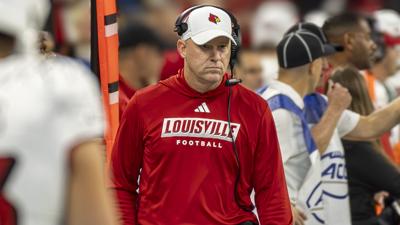LOUISVILLE, Ky. (WDRB) -- College football's helmet communication system officially arrived in 2024. Louisville coach Jeff Brohm quickly discovered more talk didn't always equal better communication.
Midway through last season, confusion crept in on defense, and Louisville reverted to hand signals. Then came one of the most telling moments:
"Sometimes, you're talking to me too much," Tyler Shough, Louisville's quarterback, told Brohm during a game.
Brohm's deadpan response: "You shut your mouth. I'll talk to you as much as I want."
Louisville | Kentucky | Indiana | Eric Crawford
That line drew laughs — "I'm just teasing," Brohm said — but it also underscored a larger truth.
"I can maybe talk too much, and it gets muddied," Brohm conceded. "You've got to be a little more concise and not over-talk, to be quite honest. Be clear, and, sometimes, just let them play ball."
And the offensive side was the smooth part. Louisville wound up ditching its helmet communications on defense altogether and returning to hand signals midway through the season when the helmet calls and adjustments were causing more confusion than clarity.
Since then, Louisville has spent the offseason refining its system, and Brohm said they've landed on a much smoother approach:
"I think now we have a better system that we're going to work all fall camp," he said. "... So we have it down as well as we can for the first game."
Louisville is one of the few major programs to openly discuss its helmet comm learning curve. But the broader rollout wasn't exactly smooth across all Power 4 schools:
- In 2024, NCAA-approved helmet communications were initially unencrypted, leaving transmissions potentially interceptable via radio.
- The Big 12 confirmed that no games were proven compromised—but multiple schools, including Texas Tech, Baylor, TCU, and others, raised internal concerns and even used scanners in practice to pick up their own systems.
- League officials coordinated with GSC (the equipment provider) to roll out a software update enabling encryption before the midseason slate of games.
- Major conferences like the SEC, ACC, Big Ten, and Big 12 have since reviewed guidance with schools—though few coaches have publicly discussed technical issues, Louisville stands out for its transparency on mix ups and human.
Brohm's blunt moment with Shough taps into something bigger — a reminder that even with high-tech gear, clearer communication often comes down to human discipline. Operationally, teams had to learn when helmet-comm chatter helped and when it muddled assignments. And Brohm's "shut your mouth" moment was a reminder – great coaching involves clear communication and trust.
In the end, maybe the best headset message isn't what's spoken. It's knowing when not to speak at all.
"We went through some hiccups, for sure," Brohm said. "And as you know, I like to kind of study ourselves and call around and ask other teams how they're doing it. There's some other teams went through hiccups, as well. Obviously, ours are notable because we watch our games, but I think we we were able to adjust pretty well."
Louisville Football Coverage:
CRAWFORD | From injury to impact: Caullin Lacy ready for Act 2 at Louisville
Poll Position: Louisville picked to finish 5th in ACC preseason poll; Clemson heavy No. 1
CRAWFORD | Louisville's first practice was more sweat than sizzle — and designed that way
Copyright 2025 WDRB Media. All Rights Reserved.











